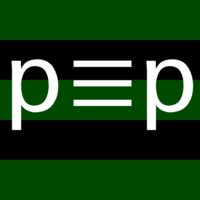Encryption for the masses with pretty Easy privacy (p≡p)
A rough overview
- Track: Lightning Talks
- Room: H.2215 (Ferrer)
- Day: Saturday
- Start: 13:40
- End: 13:55

A rough overview on the pretty Easy privacy (p≡p) project:
p≡p stands for pretty Easy privacy. The idea is to ease the use of well-known and established end-to-end cryptographic tools for already existing and widely used written digital communication channels, starting with email and radically easing adoption of OpenPGP-compliant encryption for it. Later on, XMPP-based communication channels (using e.g. OTR) and others will be added, with the ultimate goal to route all messages through GNUnet, a secure peer-to-peer framework, which doest not just protect message contents, but also metadata.
Basically, p≡p's proposed and (to some degree) already implemented protocols automate the steps taught to users at CryptoPartys, from which the project emerged.
p≡p supports multiple platforms (e.g., Android, *BSDs, GNU/Linux distributions, iOS, MacOS X and Windows), multiple programming languages and environments (e.g., C#/COM, C++/Qt, Java, JavaScript, Objective-C/Swift and Python) and will provide easy access to multiple crypto technologies through an abstract API which doesn't require application developers to have in-depth cryptographic knowledge, i.e. the p≡p engine takes care of the details. The focus for now is to have OpenPGP-compatible communications for email widespread, using already existing crypto tools like GnuPG and a NetPGP fork (needed for iOS).
p≡p's core parts (the p≡p engine and the adapters / bindings for different programming languages) are owned by the Swiss-based, tax-free p≡p foundation and held under the GNU GPL v3 license alongside with the p≡p trademarks. The foundation is run by privacy activists from Germany and Switzerland. Any project willing to implement p≡p will be supported, especially in the Free Software world. For trust and security reasons, the p≡p foundation requires projects to let their p≡p implementations code audited by a trustworthy independent firm upon every release, if they want to use the p≡p trademarks, so as to make sure there are no backdoors in officially endorsed p≡p end-user software. The p≡p foundation, for cases where the money for such undertakings is not available, is willing to either finance the code audits itself or to organize such funding at least.
p≡p foundation has close cooperations with the Enigmail (Enigmail 2.0 will be Enigmail/p≡p), the GNUnet project and soon ISOC Switzerland (ISOC-CH).
But there's also extensive exchange with other groups like the CCC (particularly in Switzerland), the FSFE, the Mozilla Foundation (Mozilla Thunderbird in particular), The Reva & David Logan Foundation and the GnuPG project.
The Lightning Talk will be quite short: 10mins. 5mins will be reserved for (hopefully) lots of questions. :) (For further and more detailled questions, just visit us at the GNU Taler / p≡p foundation stand in building K, level 1, group A.)
The speaker, Hernâni Marques, is council member of the p≡p foundation.
(Note that this talk was originally going to be presented by Volker Birk, p≡p foundation's council president, who now cannot be present.)
Speakers
| Hernâni Marques |
Attachments
Links
- p≡p foundation site
- p≡p White Paper (PDF)
- First code audit of the p≡p engine (v0.8)
- Foundation's constituiting documents (foundation's deed)
- Overview of p≡p end-user software (being developped)
- p≡p's core code (source repositories)
- @pEpFoundation (Twitter)
- Longer p≡p talks (video podcasts @ YouTube)
- End-user documentation for p≡p implementations by p≡p security
- Work-in-Progress: Internet-Drafts for p≡p protocols (to become RFCs)
- p≡p for Android source code
- Enigmail/p≡p source code
- p≡p for Outlook source code
- p≡p for iOS source code
- Video recording (mp4)
- Video recording (WebM/VP8)
- Submit feedback